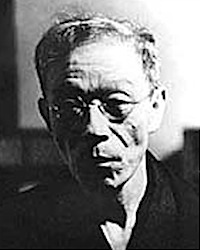Izumi Kyoka
| Izumi Kyōka | |
|---|---|

Izumi Kyōka
|
|
| Born |
4 November 1873 Kanazawa, Japan |
| Died | 7 September 1939 (aged 65) Tokyo, Japan |
| Occupation | Novelist, playwright, poet |
| Genre | Novels, short stories, plays, haiku |
| Notable works |
The Holy Man of Mount Kōya One Day in Spring The Grass Labyrinth A Song by Lantern Light Demon Pond The Castle Tower The Heartvine |
Kyōka Izumi (泉 鏡花 Izumi Kyōka?, 4 November 1873 – 7 September 1939), real name Kyōtarō Izumi (泉 鏡太郎 Izumi Kyōtarō?), is the pen name of a Japanese author of novels, short stories, and kabuki plays who was active during the prewar period.
Kyōka's writing differed greatly from that of the naturalist writers who dominated the literary scene at the time. Many of Kyōka's works are surrealist critiques of society. He is best known for a characteristic brand of Romanticism preferring tales of the supernatural heavily influenced by works of the earlier Edo period in Japanese arts and letters, which he tempered with his own personal vision of aesthetics and art in the modern age.
He is also considered one of the supreme stylists in modern Japanese literature, and the difficulty and richness of his prose has been frequently noted by fellow authors and critics. Like Natsume Sōseki and other Japanese authors with pen names, Kyōka is usually known by his pen name rather than his real given name.
Kyōka was born Kyōtarō Izumi on November 4, 1873 in the Shitashinmachi section of Kanazawa, Ishikawa, to Seiji Izumi (泉 清次 Izumi Seiji?), a chaser and inlayer of metallic ornaments, and Suzu Nakata (中田 鈴 Nakata Suzu?), daughter of a tsuzumi hand-drum player from Edo and younger sister to lead protagonist of the Noh theater, Kintarō Matsumoto. Because of his family's impoverished circumstances, he attended the tuition-free Hokuriku English-Japanese School, run by Christian missionaries.
...
Wikipedia
